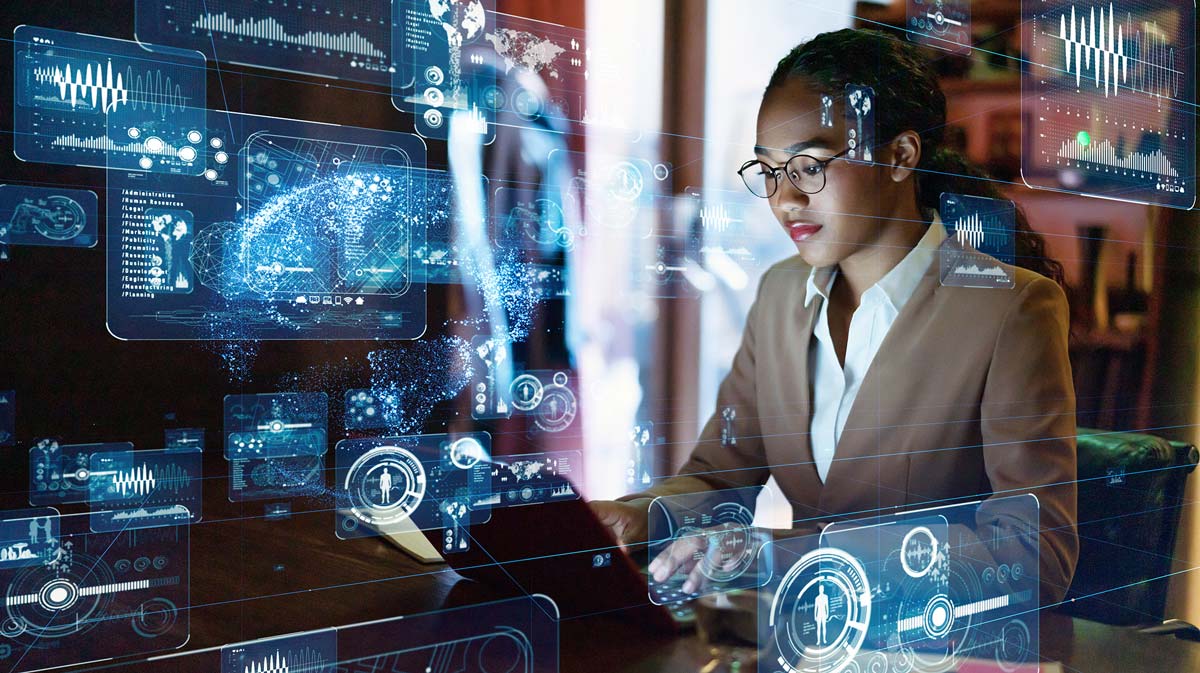
HRL to Make SENSE of Analyst Neuro-Ergonomics
Project for National Geospatial-Intelligence Agency Will Evaluate Efficiency and Effectiveness of AI-assisted Tools for Analysts
MALIBU, California. March 21, 2023— HRL Laboratories, LLC, has been selected by the National Geospatial-Intelligence Agency (NGA) to proceed with Sensemaking Effectiveness using Neurocognitive Signatures of Efficiency (SENSE), a tool to comprehensively gauge the impact of AI tools on analyst performance.

SENSE will assess the effectiveness of AI tools designed to aid analysts of geospatial intelligence satellite images.
New artificial intelligence (AI)-assisted tools hold promise that they are cognitively efficient and improve human performance for analysts who analyze imagery and geospatial information. However, it is not currently possible to assess whether the tool is working as intended. For example, an AI-enabled decision-assistance program designed to improve an analyst’s throughput rate could overload the analyst over time creating a long-term performance issue.
HRL proposes SENSE as a system capable of assessing efficacy of new AI-enabled tools by measuring and modeling cognitive states of analysts using behavioral and neurophysiological indicators to optimize geospatial intelligence (GEOINT) workflows. Such assessments will help engineers find a proper balance between analyst fatigue and analysis improvement offered by human-machine teaming.
“With human-machine teaming, a GEOINT analyst’s task becomes confirming objects that a new tool detects,” said Evelyn Kim, Principal Investigator on SENSE in the Intelligent Systems Lab at HRL. “SENSE captures how the tool affects the analyst’s cognitive states and workflow in real time based on the analyst’s performance, behavior, and physiological states. SENSE also offers a capability to conduct post-hoc evaluation to help NGA operators with sensemaking and optimizing analyst workflow.”
Kim pointed out that GEOINT data analysis is difficult and requires intense focus. Considering the importance of analysis of events such as satellite image annotation and cartographic finishing, understanding challenges in the underlying tasks and effectiveness of new tools is important. “There are three aspects we are analyzing: behavioral, performance, and cognitive,” Kim said. “These will tell us how accurate the analyst under observation is, what their throughput rate is, and how quickly and severely they become fatigued by the workload. We will analyze these aspects using a multimodal sensor suite that does not interfere with the analyst’s workflow. SENSE will also be developed as a tool-agnostic platform such that NGA can evaluate the efficacy of any tools of interest.”
All HRL research on human analyst participants is outlined in a research protocol and cleared through an institutional review board. The HRL team’s experience with active cognitive sensing is extensive and will be leveraged to guide the project.
This material is based upon work supported by the National Geospatial-Intelligence Agency under Contract No. HM0476-22-C-0065. Any opinions, findings and conclusions or recommendations expressed in this material are those of the author(s) and do not necessarily reflect the views of the National Geospatial-Intelligence Agency.
HRL Laboratories, LLC, California (hrl.com) pioneers the next frontiers of physical and information science. Delivering transformative technologies in automotive,aerospace and defense, HRL advances the critical missions of its customers. As a private company owned jointly by Boeing and GM, HRL is a source of innovations that advance the state of the art in profound and far-reaching ways.
Media Inquiries: media[at]hrl.com, (310) 317-5000